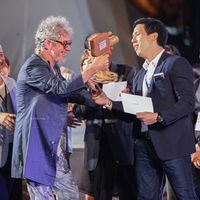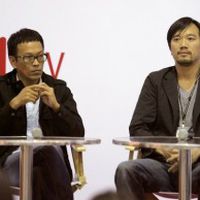The Rites Of Passage Of A Filmmaker: Rejection And The Resilience That Is Created From It
As a filmmaker, and as an artist, rejection comes as a price in our pursuit of creative enlightenment, and fame and fortune. Though no filmmaker wants to admit it, rejection is supposed to equip us with drive, determination, and patience. It is supposed to challenge our discipline to work on our craft and skill, to better ourselves. Allowing us to return better, stronger and wiser.
Rejection. Being turned away, getting the thumbs down. We have all been there before. Rejection from Film Festivals for the film that you have given your blood and sweat to produce. Rejection from screenplay contests for the screenplay that you have spent countless nights writing. Rejection from production companies for the job you really wanted, and knowing that it went to a director with better credentials, though not necessarily with better skills. Rejection from the industry in general for not being popular, media-savvy or controversial enough.
After graduating from New York University with an Honours degree in Film/TV production, I returned to Singapore with high, and presumably false, hopes and expectations. A note to all foreign graduates of Film/TV Production, wanting to direct the moment they graduate: It doesn't happen. And it shouldn't.
I was brought down from my “I'm-from-the-same-school-as-Woody-Allen-and–Oliver-Stone-so-I-must-be-good” attitude when faced with a mountain of rejection. It was a wake up call to the film industry. I took the first job I could get my hands on after months of idling at home; an internship on the Singapore movie, “Perth”. This was my foot into the industry, not into directing, and it was to be my rite of passage of hard knocks. From then on, I worked as an Art Assistant, a Set Dresser, an Assistant Director, doing anything but the directing that I wanted.
In the midst of coming to terms with working from the bottom up, I struggled to put together a low budget short film, “Crammed”. I sent it to as many film festivals as I could afford with my measly pay. Thankfully, it won an award, the Asian New Force Critics award at the Hong Kong Independent Short Film & Video Festival, and this inspired me to direct another short film, “Family Portrait”. Short films tend to put you in the red, so after ‘Crammed' I had to go back to working odd jobs to pay for ‘Family Portrait'. And herein lay the viciousness of the cycle. I am submitting my second short film to countless festivals again. For every festival I am accepted into, countless more will send me a rejection without even a look at it. I believe I have created a piece of work I am proud to call my own. Furthermore, those who have seen are touched by it, and I have received many positive comments from audiences. Still, my opinion does not really matter. What matters is the opinion of programmers, and the politics that is involved in selecting work. My film is just one of the thousands of short films they have to sift through.
As a freelancer, I have to keep sending my resume to companies, to remind them of my mere existence. On my own, I keep reading, researching, working on my craft. Countless nights spent on the tedious process of honing scripts I know no one would read. I slog on movie and television productions so that at the end of the day, the glimmer of hope of learning, going through the process, and being a better filmmaker shines through, and this reminds me of why I started out as a filmmaker in the first place.
Is it worth it?
Frankly, I don't know. What was once a fresh and excited soul has slowly given way to a more knowledgeable filmmaker, a more mature artist, and a sense of cynicism With each screenplay I write, it becomes increasingly difficult to reach out to the huge reserve of subconscious, hidden emotions, fantasies and memory where all of my best stories come from – The gut. To reach into it, I will need a clear mind, a state of relaxation where I allow my instincts and creativity to flow. Rejection, and all the anger and disappointment that comes with it, clouds my judgment and journey into my gut. The dilemmas involved are cruel; do I write a story I want to tell? Or do I write something commercial?
This battle has claimed the lives of many filmmakers; countless aspiring writers, directors, actors drop out because of fatigue, anger, disappointment, disillusionment. Filmmaking is a tough business. It is not enough to be a good filmmaker. You have to stand out from the thousands of aspiring filmmakers who are fighting for the same few coveted slots in festivals, competitions, cinemas etc. Being good does not mean you will stand out. You have to be media-savvy, promoting yourself shamelessly, networking constantly to move up the corporate ladder. After all, show business is still a business.
Some people ask me how do aspiring filmmakers get their foot in the door? Really, there is no formula to being in the business. I start off making short films and will continue to do so. And that's my calling card. But I also worked from ground up and that is my war experience. I knew a friend, who slaved through a certain television network in Singapore (wait, there is only one…) for years, just so he can learn the art of scriptwriting and doctoring. And another who worked his way up from Assistant Producer to Director of several television series, just so he can be a director of his own short and feature-length films. As artists they share common factors: Passion (which everyone has, and it is quite easy to have), Persistence, and Discipline to hone one's craft (which very few have). But possessing these traits does not guarantee anything if one falters after rejection. To put it in another perspective, or bluntly if I might add, rejection separates the hobbyists from the artists
Rejection must be made to feed other attributes like determination, resilience and focus. I believe great filmmakers learn from rejection and strive on in the hope that one day, we will be on stage grasping our award (For me, it's the Palme D'or.), giving our acceptance speech.
When all is said and done, what is most important for filmmakers, I believe, is the process and journey of filmmaking. This energy keeps us alive with endless possibilities and the expressive artistry that comes with it. . Because we know that despite the pain of rejection, and the willingness to go through with it over and over again, all we are looking for is one thing…acceptance.
And herein lay the viciousness of the cycle.
an article by filmmaker ELLERY NGIAM edited by Juan Foo



